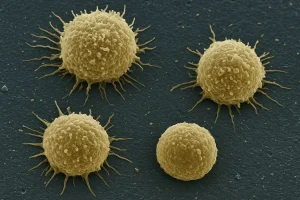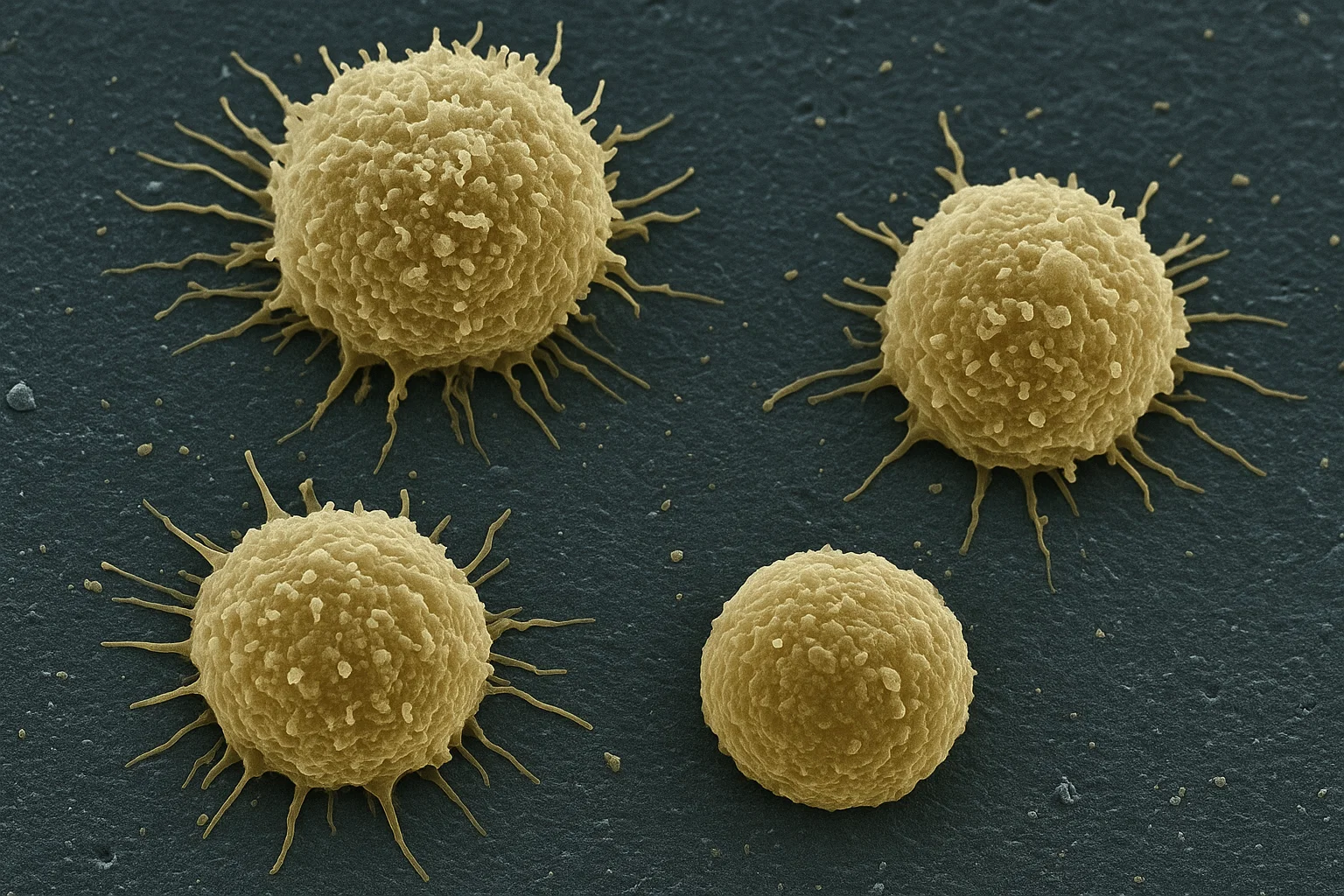Natural Killer (NK) cells are specialized white blood cells that form your body’s first line of defense against cancer cells, virus-infected cells, and other abnormal cells. NK stands for “Natural Killer” because these cells can immediately recognize and destroy threats without prior exposure or activation, unlike other immune cells that require training.
What Does NK Mean?
NK is an abbreviation for “Natural Killer,” referring to these cells’ innate ability to kill abnormal cells spontaneously. The term “natural” distinguishes them from other cytotoxic cells that need specific activation signals. NK cells were discovered in the 1970s when researchers noticed certain lymphocytes could kill tumor cells without prior sensitization, earning them this distinctive name.
What Are the NK Cells?
NK cells are large granular lymphocytes that constitute 5-15% of circulating white blood cells. These immune warriors patrol your bloodstream and tissues, constantly surveying for cellular abnormalities. Key characteristics include:
• Size and appearance – larger than typical lymphocytes with distinctive granules
• Origin – develop in bone marrow from common lymphoid progenitors
• Lifespan – relatively short-lived, typically 1-2 weeks
• Location – found in blood, spleen, lymph nodes, and peripheral tissues
• Function – immediate response to threats without prior activation
NK cells use sophisticated recognition systems to distinguish healthy cells from abnormal ones, primarily through missing-self recognition and stress-induced ligand detection.
What Is the Difference Between NK Cells and Killer T Cells?
| Feature | NK Cells | Killer T Cells (CTLs) |
|---|---|---|
| Activation | Immediate, no training needed | Requires antigen presentation |
| Recognition | Missing-self and stress signals | Specific antigen-MHC complexes |
| Response time | Minutes to hours | Days to weeks (first exposure) |
| Memory | No immunological memory | Forms memory cells |
| MHC dependency | MHC-independent | MHC class I dependent |
The key difference lies in their activation mechanisms: NK cells provide immediate innate immunity, while killer T cells offer targeted adaptive immunity with memory formation.
How to Increase Natural Killer Cells?
Lifestyle interventions:
• Regular exercise – moderate aerobic activity boosts NK cell count and activity • Quality sleep – 7-9 hours nightly maintains optimal NK cell function • Stress management – chronic stress suppresses NK cell activity • Balanced nutrition – adequate protein and micronutrients support cell production
Dietary approaches:
• Mushroom supplements – shiitake, reishi, and maitake enhance NK activity • Vitamin D – maintains optimal levels through sunlight or supplements • Probiotics – gut health directly influences immune cell function • Green tea – EGCG compounds support NK cell proliferation • Omega-3 fatty acids – fish oil supports immune cell membrane health
Natural compounds:
• Curcumin – anti-inflammatory properties support NK function • Quercetin – flavonoid that enhances immune cell activity • Zinc – essential mineral for immune cell development • Selenium – antioxidant that protects NK cells from oxidative damage
Are NK Cells Phagocytic?
No, NK cells are not phagocytic. Unlike macrophages and neutrophils that engulf and digest pathogens, NK cells use different mechanisms to eliminate threats:
• Cytotoxic granules – release perforin and granzymes to kill target cells • Death receptor pathways – trigger apoptosis in abnormal cells • Cytokine production – secrete interferon-γ and TNF-α to coordinate immune responses • Antibody-dependent cellular cytotoxicity (ADCC) – recognize antibody-coated targets
NK cells kill by creating pores in target cell membranes and inducing programmed cell death, but they don’t consume the cellular debris. This cleanup function is performed by phagocytic cells like macrophages.
Clinical Significance and Research
NK cells play crucial roles in:
• Cancer surveillance – detecting and eliminating malignant cells
• Viral infections – controlling herpes viruses, influenza, and COVID-19
• Transplant rejection – monitoring for foreign tissue • Autoimmune regulation – preventing excessive immune responses
Current research focuses on NK cell-based cancer immunotherapies, including CAR-NK cells and checkpoint inhibitor treatments.
Natural Killer (NK) cells are specialized immune cells that provide immediate defense against cancer and infected cells without prior training. Unlike killer T cells that need activation, NK cells patrol constantly and recognize threats through missing-self detection. You can boost NK cell function through regular exercise, quality sleep, stress management, and specific nutrients like mushroom supplements, vitamin D, and omega-3 fatty acids. NK cells aren’t phagocytic but kill abnormal cells through cytotoxic granules and death receptor pathways, making them essential for cancer surveillance and viral defense.
This article expresses the author’s views and is not medical advice. Consult with a doctor if needed.















